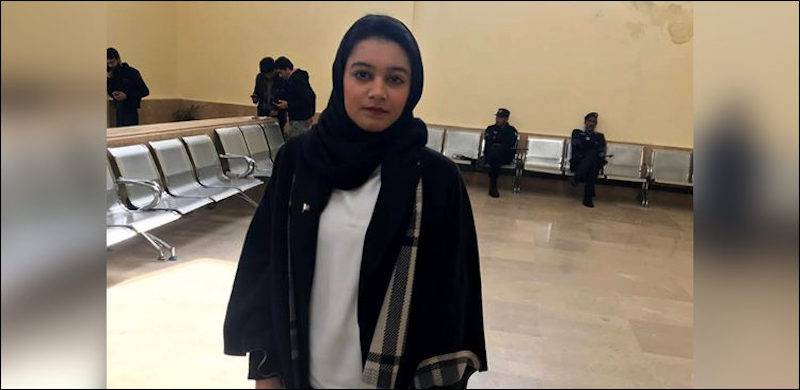
This piece is part of a series recognising the efforts and struggle of Pakistani women who challenged the status quo and paved the way for other women.
Khadija Siddiqi, a lawyer and human rights activist, fought for justice and got her tormentor convicted for his crime after braving the misogynistic justice system of Pakistan and the culture of abuse of power for three years. In 2016, Khadija Siddiqui, then a 21-year-old law student, miraculously survived being stabbed umpteen times by her classmate. She continued her struggle to obtain justice for three years.
In 2018, after a sham trial, the Lahore High Court (LHC) had acquitted the attacker, Shah Hussain. The convict, son of an influential lawyer, was being protected by the lawyers' fraternity. During the course of hearings, Khadija faced character assassination attacks many times. Pictures from her personal life were presented as evidence in the court to prove that the survivor had a 'bad character'. During the initial stages of the case, the trial court judges had adopted a lenient tone towards Shah Hussain, because his lawyers were also using intimidating tactics against the judges. On one occasion, several lawyers showed up in the court, chanting slogans in favour of the accused.
Despite this intimidation and hostilities, Khadija stood strong and vowed to take the case to its logical conclusion. Finally in 2019, she saw the attacker re-convicted for his crime when the Supreme Court of Pakistan overturned a lower court's decision to acquit the accused. Khadija's struggle is inspiring because not many women are able to brave the justice system's refusal to take them seriously. The easiest way to demonise a woman in the court is to attack her character. Judges generally do not find this practice objectionable. Misogyny is considered the norm in Pakistan's courts. Khadija faced all of it and stood tall, giving hope to other women and young girls that fighting for your rights with determination can make a difference.
Khadija Siddiqi, a lawyer and human rights activist, fought for justice and got her tormentor convicted for his crime after braving the misogynistic justice system of Pakistan and the culture of abuse of power for three years. In 2016, Khadija Siddiqui, then a 21-year-old law student, miraculously survived being stabbed umpteen times by her classmate. She continued her struggle to obtain justice for three years.
In 2018, after a sham trial, the Lahore High Court (LHC) had acquitted the attacker, Shah Hussain. The convict, son of an influential lawyer, was being protected by the lawyers' fraternity. During the course of hearings, Khadija faced character assassination attacks many times. Pictures from her personal life were presented as evidence in the court to prove that the survivor had a 'bad character'. During the initial stages of the case, the trial court judges had adopted a lenient tone towards Shah Hussain, because his lawyers were also using intimidating tactics against the judges. On one occasion, several lawyers showed up in the court, chanting slogans in favour of the accused.
Despite this intimidation and hostilities, Khadija stood strong and vowed to take the case to its logical conclusion. Finally in 2019, she saw the attacker re-convicted for his crime when the Supreme Court of Pakistan overturned a lower court's decision to acquit the accused. Khadija's struggle is inspiring because not many women are able to brave the justice system's refusal to take them seriously. The easiest way to demonise a woman in the court is to attack her character. Judges generally do not find this practice objectionable. Misogyny is considered the norm in Pakistan's courts. Khadija faced all of it and stood tall, giving hope to other women and young girls that fighting for your rights with determination can make a difference.
